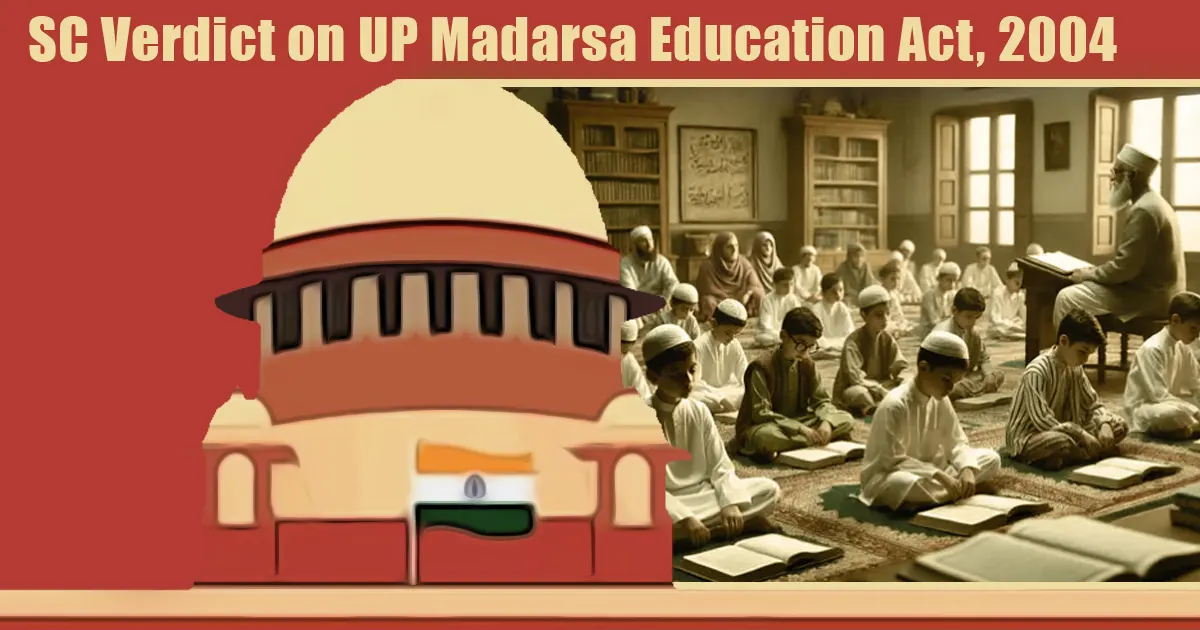
Context: The Supreme Court (SC) upheld the Uttar Pradesh Board of Madarsa Education Act, 2004, reversing an earlier decision by the Allahabad High Court (HC), which had deemed it a violation of secularism. The Act seeks to combine secular subjects with Islamic studies, offering a structured academic framework for madrasas (Islamic educational institutions).
Key Features of the Act
- Objective: The Act aims to integrate secular education alongside religious studies, ensuring that madrasas adhere to a structured curriculum.
- UP Board of Madarsa Education: The Act established a Board responsible for standardizing curricula, conducting exams, and conferring certificates, with courses ranging from Class 10 (Maulvi) to Master’s level (Fazil).
- State Funding: Madrasas are primarily funded by the state, with initiatives like the 2009 Scheme for Providing Quality Education in Madrasas (SPQEM) to enhance modern education within these institutions.
Highlights from the SC Judgement
- Partial Upholding: The SC upheld state regulation of madrasa education, but it struck down the authority of madrasas to confer higher degrees such as Fazil and Kamil. This was due to a conflict with the University Grants Commission (UGC) Act, which restricts degree-awarding powers to recognized universities.
- Balancing Minority Rights & Educational Standards: The Court emphasized the need to balance the protection of minority rights with the necessity of maintaining secular education standards in madrasas.
- Article 28(3) Protection: The Court reaffirmed that students in minority institutions are protected from compulsory religious instruction, ensuring that secular education is provided alongside religious learning.
- Secularism & Constitutional Validity: The SC ruled that secularism must coexist with religious autonomy in educational institutions, and only direct constitutional violations could invalidate such Acts.
- Religious Institutions’ Autonomy: Under Article 30, the SC upheld the autonomy of religious institutions like madrasas, allowing them to maintain their identity while complying with secular education standards imposed by the state.
- Religious Education: The Court permitted religious education in madrasas but prohibited making religious instruction compulsory, ensuring students are not forced to partake in religious teachings.
Key Implications of the Supreme Court Verdict
- Impact on UP Madrasas: The ruling mandates that UP madrasas integrate secular education while maintaining their religious identity. This creates a model for other similar institutions to follow.
- Secular Standards Compliance: The decision requires madrasas to align with the secular educational standards under Article 21A of the Constitution, which guarantees the right to free and compulsory education.
- Preservation of Religious Identity: The Court’s decision supports the continuation of religious education within madrasas while maintaining the secular framework of the national educational system.
- Broader Influence on Religious Education: The ruling may influence other religious institutions such as gurukuls and convent schools, encouraging them to strike a balance between religious and secular education.
- Precedent for Secular-Religious Balance: The SC’s ruling sets a precedent for balancing cultural autonomy with national educational norms, establishing a benchmark for religious institutions across the country.
Concerns Raised Against the Madarsa Act
- Allahabad High Court’s Perspective:
- Violation of Secularism: The HC had ruled that mandatory religious studies in madrasas violated the state’s duty to provide neutral, secular education, leading to religious-based discrimination.
- Right to Education (Article 21A): The HC argued that madrasas lacked quality secular education, violating the compulsory education mandate under Article 21A.
- Conflict with UGC Act: The HC found that madrasas’ ability to confer higher degrees like Fazil and Kamil conflicted with the UGC Act, which reserves degree-awarding powers for recognized universities.
- NCPCR’s Standpoint:
- The National Commission for Protection of Child Rights (NCPCR) raised concerns about the suitability of madrasas for proper education, citing issues like curriculum quality, teacher eligibility, and opaque funding mechanisms.
Conclusion
The Supreme Court’s verdict on the Uttar Pradesh Board of Madarsa Education Act, 2004, upholds the principle of balancing secular educational standards with the protection of religious autonomy in madrasas. The decision provides a framework for modernizing religious education while ensuring compliance with constitutional norms, especially the Right to Education. However, concerns regarding the quality and transparency of madrasa education remain, suggesting a need for continuous oversight and reforms to meet the educational standards mandated by the state.




